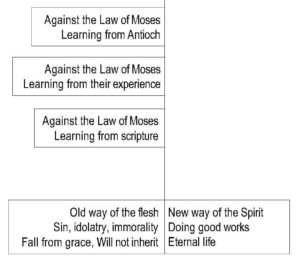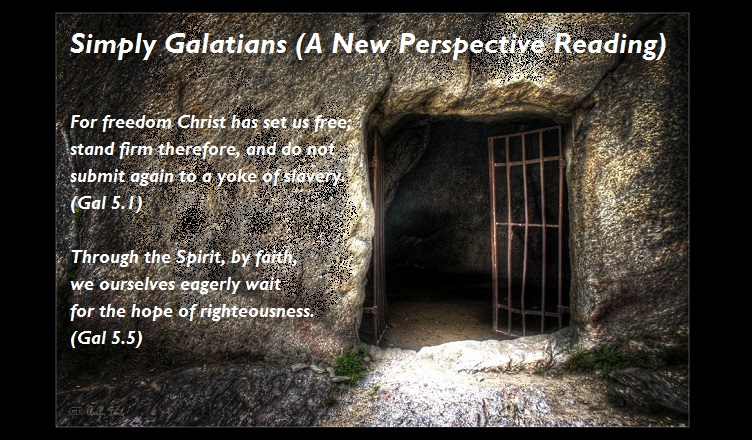From Galatians 5

In today’s post we consider the New Perspectives take on works of the flesh and the Spirit.
Several Pauline passages have historically been interpreted to refer to “the Spirit-filled life” of individual Christians, especially Galatians 5:16– 26 and Ephesians 5:18– 21. In contrast to Christians living by the flesh, understood as individuals indulging their destructive internal desires (Gal. 5: 16– 21), …
When interpreters recognize the community-oriented contexts in which these two passages are situated, however, they cannot sustain such individualistic readings.
In Galatians 5, “flesh”and “Spirit” represent two competing realms of power—the present evil age and its apocalyptic forces of darkness, on one hand, and the new creation that has arrived in Galatia with the proclamation of the gospel, on the other. These are not two competing impulses in each individual, though each person doubtless feels the tug and pull of these cosmic realms.
Paul wants his readers to see that the community result of his opponents influence in Galatia has been an increase in the power of the flesh, and this is seen in the predominance of destructive corporate practices (Gal. 5:19–21).
Paul reminds them that they have been enlivened by the Spirit of God and are now animated and sustained by the Spirit, so they ought to truly inhabit the realm of the Spirit (v. 16). (p144, McKnight, Ethical and Missional Implications of the New Perspective)
This post is part of my Simply Galatians series.
Passage and Comments
As a reminder of the context, as mentioned in my Introduction, Paul has heard the Gentile Christians were again observing various festivals and sabbaths commanded in the law of Moses and were considering circumcision.
This behaviour leads Paul to question if they have now gone after another gospel. Which is why Paul has written this letter. To stop them living according to the law of Moses and live by faith in Christ.
I have highlighted in the First Post Paul and Peters common understanding of the gospel.

Paul and Peter both believed the gospel is the story of Jesus (life, death, resurrection, appearances and coming judgment) which declares him Lord and Christ. Their gospel is in accordance with the Old Testament promises and prophecies that anticipate Christ’s coming.
The Second Post considers the implications of this Gospel for Gentile believers.

The chief implication relevant to Galatians is that Jesus in the gospel has introduced a new covenant for the people of God. The law of Moses was given to the Jews and part of the old covenant era. Jesus has inaugurated the new covenant, and consequently a new way to live as God’s people (Jews and Gentiles).
The righteous now live through the Spirit, by faith and love. This means the righteous are not longer identified by their observance of the works of law, rather by faith in Christ. This includes believing Gentiles as part of the covenant people of God.
In this second post we saw Paul argue against observance of the law of Moses by describing his confrontation with Peter in Antioch where Peter gave the impression Gentiles had to observe the works of law and become Jews.

In the Third post Paul reminds the Gentiles in Galatia of their initial hearing of the gospel and experience of the Spirit and uses these to explain the ineffectiveness of the law of Moses to produce righteousness and life. Instead through faith and the Spirit they are to think of themselves as sons who have come of age and part of God’s worldwide redeemed family.
In the Fourth post we see Paul using several examples from scripture comparing and contrasting his ministry with the Judaizers. He wants the Galatian Gentiles to realise again who they are in Christ. They have been born according to the Spirit and are children of the promise.
At the beginning of today’s passage, Paul warns the Galatians those who have taken up the law of Moses again have been severed from Christ and fallen away from grace. As a result they have reverted back to the works of the flesh, which he has associated throughout this letter with the old age under the law.
Gal 5.1-4
5 For freedom Christ has set us free; stand firm therefore, and do not submit again to a yoke of slavery. 2 Look: I, Paul, say to you that if you accept circumcision, Christ will be of no advantage to you. 3 I testify again to every man who accepts circumcision that he is obligated to keep the whole law. 4 You are severed from Christ, you who would be justified by the law; you have fallen away from grace. (Gal 5.1-4)

‘Freedom’, ‘Christ set us free’. Paul tells the Galatians Jesus has set them free from slavery to the law of Moses, which includes the works of the law and the flesh.
The person who is truly free is a person who:
(1) trusts, loves, and obeys God through Christ and in the Spirit,
(2) loves and serves others, and
(3) lives before God with a clear conscience as he or she grows before God in holiness and love. (McKnight, NIVAC Galatians)
But they are in danger of returning to their former captivity.
‘Do not submit again’, ‘Yoke of slavery’, ‘Justified by the law’. So he warns them against their former bondage and submission. They think they need to observe the law of Moses and its works in order to be righteous. They do not.
‘Circumcision’, ‘Obligated to keep the whole law’. The Judaizers want them to be circumcised. This will obligate them to observe the whole law, not just the works of the law they had been experimenting with.
As discussed earlier, sinless perfection is not in Paul’s mind here (Dunn, Galatians, Contra. Schreiner, Galatians). If Paul had been thinking along those lines, he would have to make it explicit to overrule to common Jewish belief.
Instead, Paul discourages them from circumcision with the fact they will have to obey many more commands than they are already observing.
‘Justified by the law’. Paul refers to the law of Moses, whereby those who observe the law of Moses, are identified as the righteous. That is faithful covenant members of the old covenant. This is especially with a view to future acquittal in the final judgment (Dunn, Galatians).
‘Severed from Christ’, ‘fallen from grace’. If they return to the law of Moses, their former slavery. They will in effect be turning away from Christ and the new covenant he has introduced.
Paul knows believers can fall away and believes the Galatians are in real danger of doing so.
This is why he warns them as he does here. (Contra. Schreiner, Galatians, Who rules apostasy out from the start).
Neither is Paul is giving them a warning that he knows will always be effective. Warnings are as rejectable as commands. Believers are still prone to hear either and go the other way. A good example might be the Corinthians. Paul’s standard practice is to warn his converts away from sexual immorality because the sexual immoral will not inherit the kingdom of God (cf. 1 Cor 6.9-10; Gal 5.19-21; Eph 5.5). Yet some of the Corinthians engaged in sexual immorality (1 Cor 5.1; 6.12-19). Paul’s warnings are not always effective and sin is really dangerous.
I’ve written a bit on apostasy in my page on future judgment and salvation.
Gal 5.5-6
Paul’s exhortation in these last two chapters of Galatians voice his whole argument from the beginning. The two primary themes in chapters 5-6 are Paul’s opposition against circumcision and the law, and instruction in how Christians should live in the new age without the law of Moses.
5 For through the Spirit, by faith, we ourselves eagerly wait for the hope of righteousness. 6 For in Christ Jesus neither circumcision nor uncircumcision counts for anything, but only faith working through love. (Gal 5.5-6)

‘Through the Spirit by faith’. In the absence of the law of Moses providing moral guidance, Paul encourages the Galatians to seek guidance and empowerment through the Holy Spirit and faith in Christ.
‘Hope of righteousness’. It’s not clear here what Paul means by ‘righteousness’. Does Paul refer to the future verdict of ‘righteous’ pronounced over believers? (cf. Rom 2.13; Dunn, Galatians) Or does he refer to the consummation of their salvation whereby they are fully made righteous? (DeSilva, Galatians). Or perhaps the righteousness (Christ’s death? Rom 5.18) which comes from the Spirit? (Rom 8.10-11; Washington, Galatians). I see elements of truth in each.
Paul urges them to wait in hope. Suppressed excitement. Future hope is also bound up with resurrection (Rom 8.23-24). Because Paul in Romans groups the Spirit, with hope and righteousness I tend to prefer the third option. Linking it to resurrection, which in itself implies a righteous verdict in the judgment according to works. (For more details on the judgment according to works see my page on Future Judgment and Salvation.)
‘Faith working through love’. Circumcision and the law of Moses, nor uncircumcision for that matter, will avail anything for the future judgment.
Faith working through love is the way the Galatians are encouraged to pursue the hope of righteousness.
And we see this in many passages describing the future judgment according to works (cf. Mt 12.36-37; 13.36-43; 25.31-46; Rom 2.6-11,13; 1 Cor 3.13; 2 Cor 5.9-10; Jas 2.24-26; Rev 20.12-13). (Contra. Schreiner, Galatians, who in trying to maintain reformed tradition, denies the significance of a working faith for the future verdict of righteousness)
Gal 5.7-15
7 You were running well. Who hindered you from obeying the truth? 8 This persuasion is not from him who calls you. 9 A little leaven leavens the whole lump. 10 I have confidence in the Lord that you will take no other view, and the one who is troubling you will bear the penalty, whoever he is.
11 But if I, brothers, still preach circumcision, why am I still being persecuted? In that case the offense of the cross has been removed. 12 I wish those who unsettle you would emasculate themselves! (Gal 5.7-12)

‘Running well’. Paul likens Christian confidence to that of a runner. A runner who has yet to finish the race. (1 Cor 9.24-27).
People are responsible. If they are running strong and compete according to the rules they can be confident they will finish (Phil 1.3-6).
However, not everyone finishes the race. If they are running in the wrong direction, injured or exhausted, they won’t finish. The Galatians were running well, but in returning to the law of Moses, they had fallen by the wayside.
‘Persuasion’, ‘Bear the penalty’. Paul condemns the teaching of the Judaizers and says the LORD will judge them eventually.
‘Emasculate themselves’. Paul is so distressed about what the Judaisers are doing to the Galatians, that he desires they cut off, not only the foreskin of their own penises (circumcision), but the whole member.
13 For you were called to freedom, brothers. Only do not use your freedom as an opportunity for the flesh, but through love serve one another.
14 For the whole law is fulfilled in one word: “You shall love your neighbor as yourself.” 15 But if you bite and devour one another, watch out that you are not consumed by one another. (Gal 5.13-15)
 ‘Freedom’, ‘Opportunity’, ‘To serve’. Having been freed from the law of Moses, Paul warns the Galatians away from fleshly works (discussed below), and encourages them to love one another. Love which fulfills the intention of the law of Moses they have now been freed from.
‘Freedom’, ‘Opportunity’, ‘To serve’. Having been freed from the law of Moses, Paul warns the Galatians away from fleshly works (discussed below), and encourages them to love one another. Love which fulfills the intention of the law of Moses they have now been freed from.
‘Love’. Paul has tied love to faith. What counts is faith working through love. Here we see Paul is not establishing a doing vs believing antithesis (Contra. Schreiner, Galatians). Rather he is providing a new power source (faith and the Spirit) for fulfilling the intention of the law (Dunn, Galatians).
Gal 5.16-21
16 But I say, walk by the Spirit, and you will not gratify the desires of the flesh. 17 For the desires of the flesh are against the Spirit, and the desires of the Spirit are against the flesh, for these are opposed to each other, to keep you from doing the things you want to do.
18 But if you are led by the Spirit, you are not under the law.
19 Now the works of the flesh are evident: sexual immorality, impurity, sensuality, 20 idolatry, sorcery, enmity, strife, jealousy, fits of anger, rivalries, dissensions, divisions, 21 envy, drunkenness, orgies, and things like these. I warn you, as I warned you before, that those who do such things will not inherit the kingdom of God. (Gal 5.16-21)
‘Led by the Spirit’, ‘Not under the law’. Paul contrasts the leading of the Spirit, with their old way under the law (cf. Rom 7.4-7). Paul’s implicit assumption is that a return to the law of Moses has had negative consequences for how they relate to one another.
Tertullian (c.e. 155-240) gives a helpful understanding of Paul’s use of ‘flesh’.

You may notice that the apostle everywhere condemns the works of the flesh in such a way as to appear to condemn the flesh [human bodies]; but no one can suppose him to have any such view as this, since he goes on to suggest another sense, even though somewhat resembling it.
For when he actually declares that “they who are in the flesh [bodies dominated by sin] cannot please God,” he immediately recalls the statement from an heretical sense to a sound one, by adding, “But ye are not in the flesh [bodies dominated by sin], but in the Spirit [bodies guided by the indwelling Spirit].”
Now, by denying them to be in the flesh [bodies dominated by sin] who yet obviously were in the flesh [human bodies], he showed that they were not living amidst the works of the flesh [works of sin dominated humans], and therefore that they who could not please God were not those who were in the flesh [human bodies], but only those who were living after the flesh [bodies dominated by sin];
whereas they pleased God, who, although existing in the flesh [human bodies], were yet walking after the Spirit [bodies guided by the indwelling Spirit]. (Tertullian, 1885. On the Resurrection of the Flesh. In A. Roberts, J. Donaldson, & A. C. Coxe, eds. Latin Christianity: Its Founder, Tertullian. The Ante-Nicene Fathers. Buffalo, NY: Christian Literature Company, pp. 578–579.)
‘Warned you before’. Paul refers to his initial visit with the Galatians, where they heard and believed the gospel message. During that time Paul warned these new converts of the dangers and consequences of sin.
Gal 5.22-26

22 But the fruit of the Spirit is love, joy, peace, patience, kindness, goodness, faithfulness, 23 gentleness, self-control; against such things there is no law. 24 And those who belong to Christ Jesus have crucified the flesh with its passions and desires.
25 If we live by the Spirit, let us also keep in step with the Spirit. 26 Let us not become conceited, provoking one another, envying one another. (Gal 5.22-26)
‘Fruit of the Spirit’. The fruit of the Spirit reveal the character of God. God is loving, seeks for peace, patient, good, faithful, gentle and self-controlled. When His Spirit dwells within a person they become more like God and these are the characteristics they will manifest.
‘Love’. Love as Paul has already mentioned fulfills the intentions behind the law of Moses (Gal 5.14; cf. Rom 13.8). Through love people can obey every other command. Love worships God alone, love remembers God and what he has done. Love will not take God’s name in vain. Love honours parents, love does not steal, love does not commit adultery, love does not covet another’s property.
Whereas the law of Moses prescribed concrete actions (do’s and don’ts), love can manifest in a variety of ways leaving it up to the believer how. Likewise doing good is quite ambiguous. Both leave it up to the discerning believer under the guidance of the Spirit to choose what action is needed as they see fit.
Walking in the Spirit involves listening to the inner guidance of the Spirit written on the heart, not the letter of the law. God’s Spirit is a sufficient guide for moral life before God.
Love is mentioned first in the list and the order is important. Some scholars argue all the fruits should be grouped together. God’s people ought to be growing in each of these not just a couple they deem are more important.
‘Self-control’. This fruit highlights that not all of the fruit happen automatically. People exercise self-control to resist sin, to be patient, to do the right thing under pressure.
‘Crucified the flesh’. Paul assumes all who belong to Christ have crucified their fleshly desires. This happens in part through their incorporation into Christ’s death and burial. And also part of their Christian walk in the Spirit (Rom 8.13).
Clement of Alexandria (c.e. 150-215) gives a vivid explanation of what it means to crucify the flesh.

“Why call ye me Lord, Lord,” He says, “and do not the things which I say?” For “the people that loveth with their lips, but have their heart far away from the Lord,”4 is another people, and trust in another, and have willingly sold themselves to another; but those who perform the commandments of the Lord, in every action “testify,” by doing what He wishes, and consistently naming the Lord’s name; and “testifying” by deed to Him in whom they trust, that they are those “who have crucified the flesh, with the affections and lusts.” “If we live in the Spirit, let us also walk in the Spirit.” “He that soweth to his flesh, shall of the flesh reap corruption; but he that soweth to the Spirit, shall of the Spirit reap life everlasting.” (Clement of Alexandria, 1885. The Stromata, or Miscellanies. In A. Roberts, J. Donaldson, & A. C. Coxe, eds. Fathers of the Second Century: Hermas, Tatian, Athenagoras, Theophilus, and Clement of Alexandria (Entire). The Ante-Nicene Fathers. Buffalo, NY: Christian Literature Company, p. 417.)
Words for Believers

Paul urges us to come to God and live before him through Christ and in the Spirit. If we do this we live in freedom and several things happen. We are set free from our sin and our past sins we want to forget, we are set free to serve in other centered love. If we do this we really become free in every sense.
If you want to be free, give yourself to Jesus and the Spirit.
The world as we know it now will always be prone to legalism, prejudices and selfishness. But in the Spirit and through Christ, we can live above these as God intends us too.
Click here to go to the next post in the series.
Copyright © Joshua Washington and thescripturesays, 2017. All Rights Reserved.





